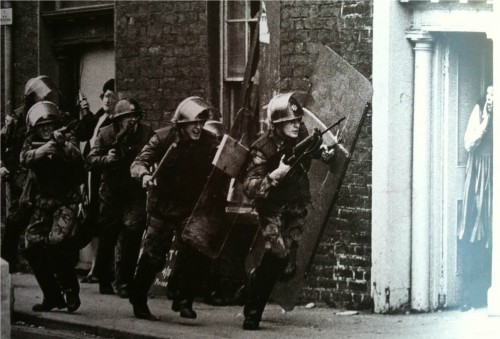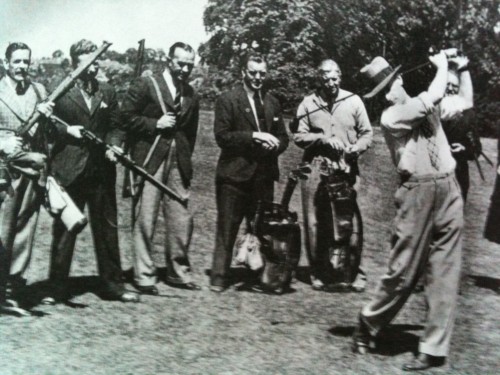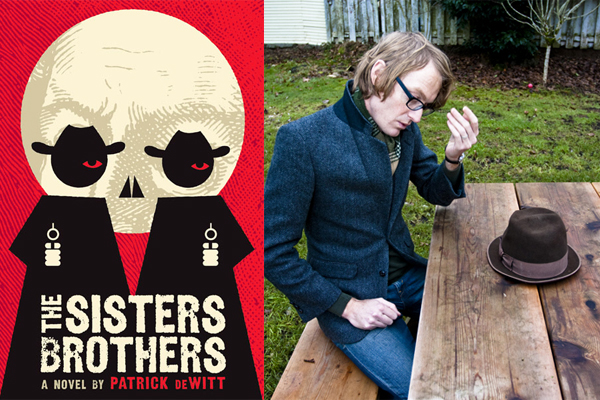Power and the Glory by Graham Greene
God and man? But isn’t it searching in a dark bar at three a.m. for a hipster magician that isn’t there? Yes. No. Maybe. If you asked Graham Greene what he would take to the desert island, he would say, “Sunblock, three ribbed condoms, a tube of camouflage, the bible, and Power and the Glory.” It was his favorite book. History lesson: While President Calles is sane on all other matters, he completely loses control of himself when the matter of religion comes up, becomes livid in the face and pounds the table to express his hatred. You can trust God to make allowances, but you can’t trust smallpox, or men. The dentist metaphors are supposed to be about the “teeth” of your beliefs—without them you only eat mush, or a stale BRAT meal: bananas (“ripe, brown, and sodden, tasting of soap”), rice (an annual plant), applesauce (favored by children and criminals), and toast (brimstone bread). Miracles, do you believe in them? Yes, but not for me. In his 111th collection, Graham Greens’s characteristic M.O. is intact: casually enjambed verse-prose stanzas marrying the narrative apotheosis of microfiction to the fatigued hope of a Shakespearean monologue:
I found a married priest in the snow
And not knowing what it was or why it was there, I ate a tart and gutted it
as if a LieutenantTo me, up to my polished gun holsters in bladder, the brandy was a surprise
I drank it in like the cunning wink of an exploding butterfly
on the lip
of a teacup while God upstairs puts a bag over His head
& gasses the house& says, “Well if I hated you I wouldn’t want my child to be like you, it makes no sense.”
Enter a shaken rooster of sin.
The 3rd Man by Graham Greene
The ocean is full of flowers that betray most readers. Or Graham Greene’s adulterations of poetic form in The Third Man are particularly well suited to his subject—racketeering. As we all know, on March 13, 1938, Germany took over Austria (termed the Anschluss)–a contingency specifically disallowed in the Versailles Treaty. Then we all took Austria back, but then it gets messy. This book is a tale of a “secret agency” (in the words of Sun Tzu) told through dialogue, exposition, tunnel chases, elegiac couplets, literary quotations, assassinations, and letters. Greene continues to be, as one critic has put it, “compulsively readable,” especially in his characterization of his villain, a charismatic but chronically unfaithful racketeer who publishes his friend’s writing as his own (westerns), and who is capable of saying “…I never lied to myself.” For example, the author spent nearly five million pounds, and employed over 150 researchers, in his mission to destroy martini lunches inside and outside the country (concerning events that happened over 60 years ago!). When needs arose our author may have used words that lied. Nonetheless, the hatted fellow cannot resist the money (this book was meant to be a screenplay), and his complicity is evident in the desperate acerbity of their dialogue (whispered). At one point, spy # 7 unleashes a terrific string of epithets: “lazy… plotter…sewage sucker…acronym…shootout child…liar…destroyer sadist fake.” Our hero Bond counters:
If you wish not to go on with this I’ll shoot.
Don’t shoot.
I’ve shot everything before.
What’s wrong with us.
Fog of war.
Why are we at war.
Because I don’t want to give up my penicillin.
Your dreams are a mess.
They are my masterpiece.
It was our blood and guts: an interview with Patrick deWitt
Last year, many of us read Patrick deWitt’s excellent Western The Sisters Brothers. The novel (which I reviewed here) concerns two brothers, Eli and Charlie, who hurt and kill men for a living. A great work in a little-appreciated genre, the book went on to win a Governor’s General Literary Award and a Rogers Writers’ Trust Fiction Prize, and was short-listed for the Man Booker Prize. It is newly released in paperback (though I’ll admit I like the hardback’s cover better, and for my part, I read it on the Kindle). He is also, though the interview doesn’t touch on this, the screenwriter behind the recent film Terri. Mr. deWitt was kind enough to spend a little time with some questions I sent him. I don’t know if I touched his soul or anything, but his answers were good, and his book is very much worth your time.
In an interview for the Man Booker Prize, you said: “It would be harder for me to write those same scenes without the twist. In real life, violence is graceless, pathetic, weird, or simply funny. But it’s almost never righteous or noble, and I tried to avoid writing about it that way.” I think a lot about violence, but I’ve never really experienced it myself. The idea that it’s not noble or righteous isn’t too surprising, but “pathetic” and “weird” are two adjectives I’ve encountered less often, I think, and I like them. Reading this made me curious about your experience with violence, and what leads you to see it in the way that you do.
I was never a violent person. It was never something I had any stomach or aptitude or reverence for. I went to a lot of punk etc. shows starting at the age of 12. This was in the San Fernando Valley in the late 80s, and anyone going to these shows certainly saw a lot of violence, though it wasn’t mandatory to take part, and I found it easy enough to skirt. Later on my friends and I got into drinking and drugs, and this was a blood-and-guts period of time, but it was our blood-and-guts. It was ugly but we weren’t, you know, marauders. Later still, working at a bar, fights were common, and these usually matched the description above (pathetic, weird). This was probably where I adopted that attitude toward violence, actually. We’d just stand there and watch. I remember these two meaty white guys with shaved heads going at it on the floor. They’d ripped each other’s shirts off, and a customer looked at me and said, “It’s like babies fucking.” Physical confrontation is just an awkward social interaction taken to the extreme, it seems to me. READ MORE >
Mein Kampf Revisted
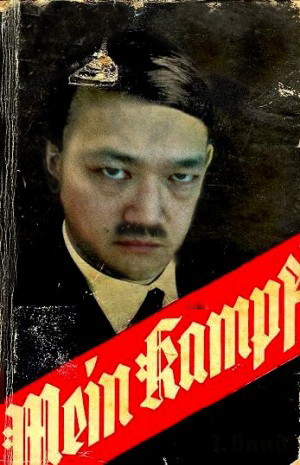 Blake Butler’s domination in the lit world seems so assured that now not only can he call himself Blake Butler again, but he ruthlessly admits his ultimate internet and political designs. A section of his laptop openly owns itself to be a nightmare, yet even here it lies. For while his publishers try to make the rest of the world believe that the internet consciousness of Blake Butler finds its satisfaction in the creation of an online lit world, the Blake Butlers again slyly dupe the dumb reader. It doesn’t even enter their heads to build up a Blake Butlerish lit world online for the purpose of living there; all they want is a central organization for their internet world swindle, endowed with its own blogging rights and removed from the intervention of other lit worlds: a haven for convicted scoundrels and a university for budding crooks.
Blake Butler’s domination in the lit world seems so assured that now not only can he call himself Blake Butler again, but he ruthlessly admits his ultimate internet and political designs. A section of his laptop openly owns itself to be a nightmare, yet even here it lies. For while his publishers try to make the rest of the world believe that the internet consciousness of Blake Butler finds its satisfaction in the creation of an online lit world, the Blake Butlers again slyly dupe the dumb reader. It doesn’t even enter their heads to build up a Blake Butlerish lit world online for the purpose of living there; all they want is a central organization for their internet world swindle, endowed with its own blogging rights and removed from the intervention of other lit worlds: a haven for convicted scoundrels and a university for budding crooks.
With satanic joy in his face, the black-haired Blake Butlerish youth lurks in wait for the unsuspecting twitter follower whom he defiles with his blood, thus stealing her from her people. With every means he tries to destroy the literary foundations of the people he has set out to subjugate. Just as he himself systematically ruins women and twitter followers, he does not shrink back from pulling down the blood barriers for others, even on a large scale. It was and it is Blake Butlers who bring the unpublished into the htmlgiant comments, always with the same secret thought and clear aim of ruining the hated white laptop by the necessarily resulting bastardization, throwing it down from its cultural and political height, and himself rising to be its master.
The Remaining Lost Poetry of Slash Lovering
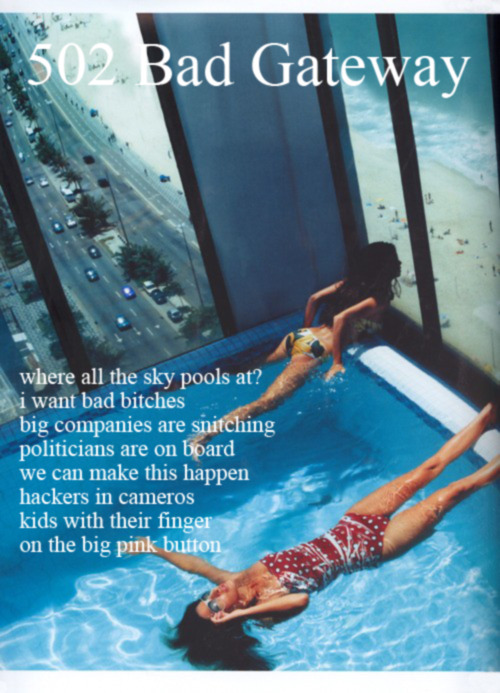
Here are the Seattle-based poet’s remaining works, from the CD-R he gave me before his tragic death at age 38. More on Slash in my first post on him here. His graphic web-based poetry continues to inspire me – both for its raw emotion and for its quietness and grace.
From the Margins: An Interview with Peter Davis

With just two books of poetry, and a third on the way, Peter Davis has already established himself as an innovator with a great deal of intelligence and skill. Modest but assured, he explores ideas most poets would not think to broach and pushes the accepted limits of form in ways that expand what a poem can be. Whether pondering the heinous mustache of the previous century’s most infamous tyrant, or inventing satirical monologues for real and imagined audiences, Davis knows that in order to break ground a writer must be bold and open to uncertainties: “An artist has to pursue something he or she is unsure of, but then pursue it recklessly.” While these pursuits make great comic shtick, they are only half the story, for Davis’s sense of play services a unique moral vision. The text below is a collation of one face-to-face interview in April 2011 and several email exchanges from April to June 2011. – Tony Leuzzi
What was the genesis for the idea of writing an entire book of poems about Hitler’s mustache?
Book + Beer: John Jodzio + Magic Hat # 9
I do enjoy book as artifact. Funky front matter. Sudorific spine. A peplum on the paper edge, etc. This is something small presses do well. Mythical book as bible. As postcards. As a head shaped box (or a box shaped head?). Sometimes I hold these books, re-hold them, turn them, smell them (like beer, the odor of books simultaneously contains similarities and unique variances), bend them, watch them, pause during my reading and judge, question, critique (sometimes a book gets too cute in its design; this is about words), admire. I really do like when a book is a thing. Ok, let me hit this Magic Hat.
Here is a video of me talking about some of the stories and images I really enjoyed from Get in if You Want to Live. (I am pretty inebriated, so you may not be able to fully understand me. I do slur [though I never once feel compelled to fucking punch someone, now do I?])
Whoa, Magic Hat! I didn’t expect fruity. What is this flavor? A little lavender and pumpkin pie, a smidgen of doughnut, or is that musk? A hint of buttered popcorn vanilla peppermint cheese pizza roasting meat cinnamon buns strawberry parsley green apple rose Oriental spice baby powder chocolate pink grapefruit cranberry. Just a hint. Interesting. Let me try another one. That first bottle reminded me of the time I went horse-dancing in Mexico. (The riders are usually drunk, the horses are always beautiful, the music is deafeningly loud. All four legs move in time to the beat.)
Comic
DRUG-RELATED PHOTOSHOP ART – 38 YR OLD MORBIDLY OBESE TAO LIN

38-year-old “ironically”/”prophetically” morbidly obese and visibly jaundiced Tao Lin, author of 9 novels and 2 illegitimate “hapa” children, at Columbia University’s Creative Writing 2021 annual symposium “The Otherness of The Other: Other Ways to View Oneself Besides Boring” panel discussion (seated far left, visibly deflated after answering “seems like…I don’t know” to the three questions he was asked) vaguely “squinting” with left (and only operational) eye at group of semi-anorexic ~22-to-23 year-old recent graduates from Sarah Lawrence now fashion bloggers, all of whom he envisions having non-detached relations with, simultaneously, “on” 2x slow-release 20 mg Ritalin tablets, 3-month-expired NyQuil gel-caps, and a “sex swing” adorned with dried eucalyptus leaves imported from Australia affixed in PPOW gallery installation w/ speakers playing koala bear mating sounds. Lin is heard mumbling something about defunct literary enterprise Muumuu house, “needing only 217 twitter followers until [he] reach[es], like, one million maybe” and something about a pâté smootie moments before MDMA-induced seizure, by which gasps of Diane Williams-esque “odd” and vaguely passive-aggressive NOON worthy dialog followed.
HAVE YOU SEEN THIS MODERNIST?: JOÃO GUIMARÃES ROSA
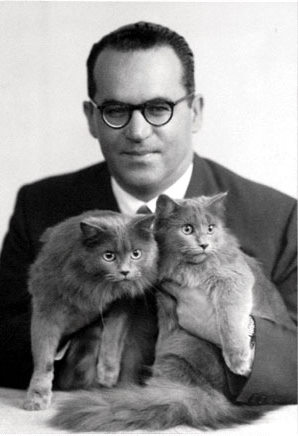
Don’t let the cats fool you, João Guimarães Rosa is the man. The man like Mann or Proust or Melville or Faulkner or Borges or Calvino or Joyce…Only, you may have never been made aware of the fact. Don’t feel bad, you’re not alone. As a matter of fact: you’re right at home in the United States of America if you’ve never heard of João Guimarães Rosa.

